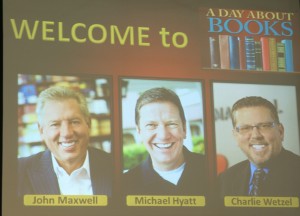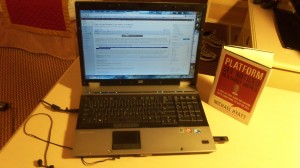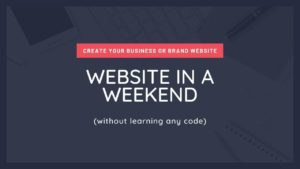Yesterday I had the great opportunity to attend an event called “A Day About Books”. John Maxwell, Charlie Wetzel and Michael Hyatt shared their thoughts on book writing and the platform used to get your word out. You might be tempted to stop reading right here if you think “I am not interested in writing a book, why would I be interested in reading this?” Well here is why you should continue reading … ultimately you want people to hear what you have to say. Have you given any thought to how you deliver your message, who will hear it and what they will in turn, do with your message after hearing it?
I am of the belief that every person in this world has a unique story and a story that is worth being told. The problem is that most people either don’t think their story is worth hearing or they simply do not have any way to get their story out to be heard.
NEWS FLASH! “IF YOU HAVE A COMPUTER AND A KEYBOARD, YOU HAVE ALL THE NECESSARY TOOLS NEEDED TO TELL THE WORLD YOUR STORY.”
I listened intently as John and Charlie spoke about the creative process that goes into writing a book, and was fascinated by the way the two of them complimented each other in sharing not only values and ideas, but almost as if they were reading each others minds. I suppose more than two decades of working together will do that for you. I am currently working on my first book and although the finish product is far from complete, I can now see the path to follow to complete the journey.
More than once I have heard John talk about writing a thesis for his books and I really never understood what he meant by this. Now I better understand that if you can help people with what you write in your book, they will not only read it, they will buy it too.
The logical questions to answer in writing a thesis for your book would be:
- What do I want the reader to know?
- What do I want the reader to do?
From there, write the outline which should consist of 3 or 4 points for each chapter that all point back directly to the thesis. The rest of the content can be related to the thesis but is pretty much filler for the book. The thesis and outline are the backbone of your story.
OK, so now you have an idea that you want the world to hear. In my example above it is a book but it could be anything. A book, video, ebook, DVD, CD, some kind of service, it really doesn’t matter unless you have a PLATFORM to tell the world about it.
Michael Hyatt spent about an hour hitting the highlights of his recently released book Platform, Get Noticed in a Noisy World. There is way too much information to share here to do justice to the information provided in the book, so I suggest you just go get a copy and read it. I will say this, Hyatt has done an outstanding job of covering all the bases and not overwhelming the reader with too much techie info.
Hyatt suggests 3 Benefits of Building a Platform
- Visibility – The amount of people that can see you is directly related to the number of people that can hear you.
- Amplification – A platform allows you to get your story out to many and then they will in turn, tell many more.
- Connection – A platform gives you multiple resources to connect with anyone capable of hearing your story.
Hyatt breaks down Platform, Get Noticed in a Noisy World into 5 parts:
- Part One: Start With The Wow – Content is King. If you bring a poor product, the platform won’t matter.
- Part Two: Prepare to Launch – The launch of your product is not an event, it is a process. Remember that!
- Part Three: Build Your Home Base – This is the piece of your platform that you own and control i.e. a blog, podcast or video. Protect this unconditionally.
- Part Four: Expand Your Reach – Stay focused on your “why” and spread your word.
- Part Five: Engage Your Tribe – These are the people that share your values and your passion. These are the ones that need to hear your story.
Don’t be intimidated into thinking that you have to write a book or create a website to get your word out, all you really need is the platform to do it.
WHAT IS YOUR STORY AND WHO NEEDS TO HEAR IT? MORE IMPORTANTLY … WILL THEY?
Barry Smith www.buildingwhatmatters.com 6/24/12




Great take Barry. We all have a platform. It’s just a question of how we choose to use it, how we choose to build it. Your synopsis of the event has a lot of great nuggets to help in choosing and building. Thanks for compiling them and sharing them.
Sometimes people need to stop the voice that tells them no one is interested and do it anyway. I did that with my childrens book and just recently 50 of them were shipped to a school in Africa as part of a missions project, if people knew how many times I had to fight that voice back they would be shocked. Thanks for the post!
Thanks for the compliment Paul. I very much enjoyed the event and putting together the post was a great way to review and write down my thoughts. I like what you point out as related to “choose it” and “build it”. Those are the two things needed for us to “DO” it. Sometimes starting is the most difficult phase of completing something.
Outstanding thought Tim. I can’t count how many times I have been guilty of that myself. I guess what it comes down to is “what do we have to lose in trying and what to we have to gain in succeeding?” For me, I think I will go ahead and risk the failure for what could be an incredible reward. Thanks for sharing Tim.